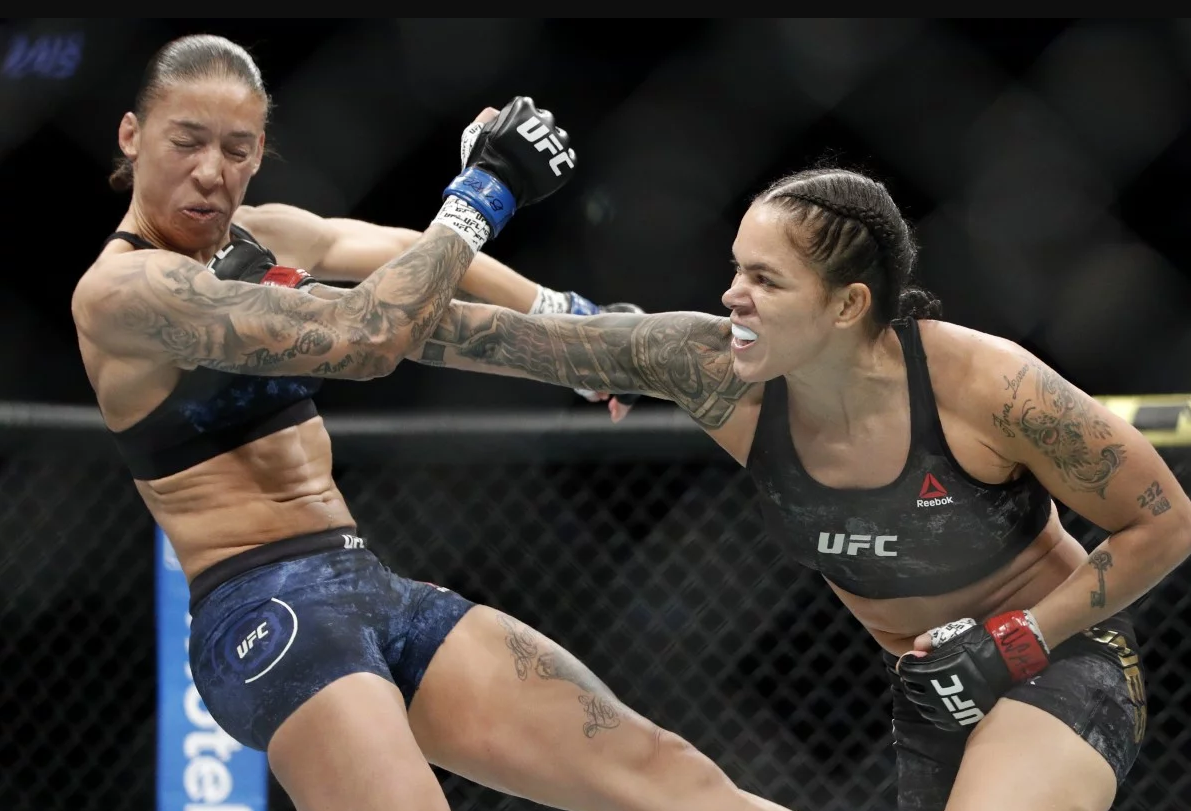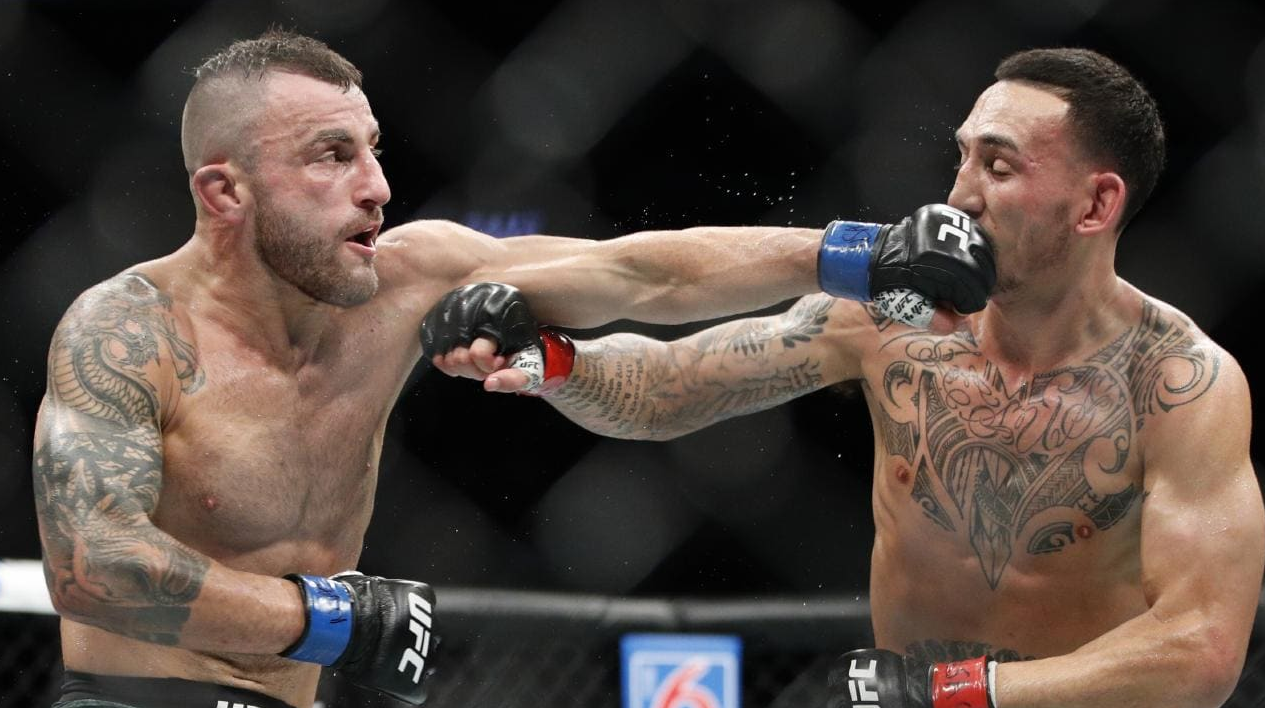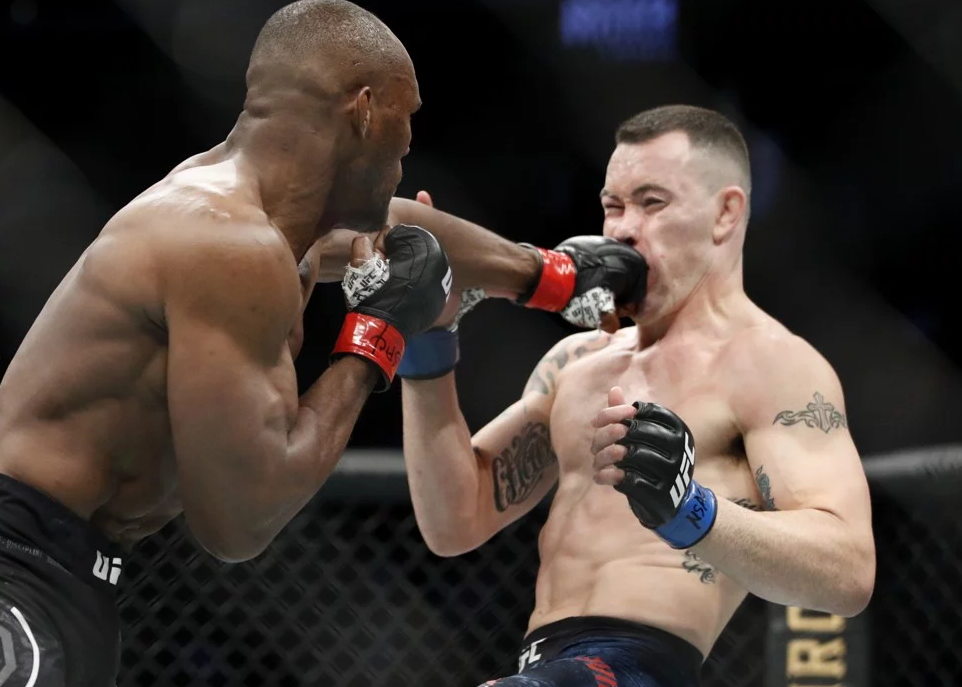The Ultimate Fighting Championship (UFC) brought its year to a close with UFC 245, a numbered PPV that featured three championship bouts with important results.
UFC Women's Bantamweight Championship: Amanda Nunes (c) def. Germaine de Randamie by unanimous decision (49-44, 49-46, 49-45)

Amanda Nunes hits Germaine de Randamie with a hard right at UFC 245 /AP Sports Photo
Amanda Nunes hits Germaine de Randamie with a hard right at UFC 245 /AP Sports Photo
This wasn't the fight anybody expected. The two women faced each other before in 2013 and Nunes made quick work of de Randamie, winning by TKO in round 1. It's a testament to how much she has improved as a fighter that this title bout went the distance. Her resilience against Nunes' high pressure, high variety offense is commendable, as were the repeated attempts to snatch a win with a single powerful strike or, as in the third round, a reversal that took Nunes from being in top position and into a de Randamie triangle choke attempt.
The other outcome that should strike fear into the whole women's bantamweight division, is that defending champion Amanda Nunes – the woman who ended Ronda Rousey's career, the only person to hold multiple wins over UFC Women' Flyweight Champion Valentina Shevchenko, the woman who knocked out Cris Cyborg for the first-and-only time in her 14 year career to become a two-weight champion – has gotten even better.
Known best for her heavy hands, Nunes has seemingly done everything she can to cement her place as the pound-for-pound best women's fighter and begun to add grappling and submissions to her game. Germaine de Randamie is a full-time MMA fighter who got her start as a kickboxer, so it made sense to Nunes to focus on the weakness in her rival's game, but her use of the ground game is so advanced that it goes beyond simple preparation. There are too many highlights to pick: level changing from a jab, bouncing her opponent of the cage to force her to the mat, folding her up like an according to utilize ground-and-pound not seen in the UFC since the mid-2000s. The victory was hard earned and well deserved.
UFC Men's Featherweight Championship: Alexander Volkanovski def. Max Holloway (c) by unanimous decision (48-47, 48-47, 50-45)

Alexander Volkanovski tags max Holloway with a left jab at UFC 245 /AP Sports Photo
Alexander Volkanovski tags max Holloway with a left jab at UFC 245 /AP Sports Photo
Max Holloway must have thought he was in a re-run. Earlier this year at UFC 240, Holloway defended his title against Frankie Edgar, his 14th win in 15 fights. Five months later, he's fighting Alexander Volkanovski, a fighter that embodies everything in Edgar, but is also younger and with a lot less miles on the clock.
Holloway's nickname is "Blessed" and he truly is in the sense that there's no fighter in his division who is so genuinely ambidextrous. Unlike others who will coach southpaw stance to add an extra layer of distraction to their game, he's able to hit hard from all angles at all times. Volkanovski, on the other hand, is a lethal combination of limitless cardio and perpetual motion. Like a younger Frankie Edgar, it's borderline impossible to look at all the feints, footwork and frenetic motion and figure out what punches and kicks will actually hit and what is noise.
He also comes from Auckland City Kickboxing – the same camp UFC Men's Middleweight Champion Israel Adesanya hails from – a team well known for thinking through fights down to the smallest of details and from the very start, it was clear Vokanovski had planned it down to the smallest detail.
From the beginning, Volkanovski utilized legkicks to limit Holloway's range of motion. By the end of the second round, the welts on his left leg were so prominent that he was forced to switch stances – and then Volkanovski worked on the right leg too. Holloway still had a size advantage – 5'11" vs. 5'6 – and he is simply too versatile to be closed down easily, yet every round was a minimization from the challenger and he ultimately took the gold, ending the "Blessed Era."
UFC Men's Welterweight Championship: Kamaru Usman (c) def. Colby Covington by TKO (Round 5, 4:10)

Kamaru Usman blasts Colby Covington at UFC 245 /AP Sports Photo
Kamaru Usman blasts Colby Covington at UFC 245 /AP Sports Photo
It's rare to see a title match in the UFC where the fighters are so similar. Both are fighters with strong wrestling backgrounds that made their debut in 2012, both had records of 15-1-0 before the bout and both came in to it on the back of dominant decision wins: Usman left then-champ Tyron Woodley completely deflated after five rounds of dominance and negation – Woodley hasn't fought since – and Covington did near enough the exact same thing to veteran tough guy Robbie Lawler. The comparisons didn't sit well with Usman, a Nigerian-born fighter, and Covington, a self styled MAGA-man who met U.S. President Donald Trump upon winning the UFC's interim Welterweight belt.
Two pressure fighters with careers full of grinding decision coming together like this felt like the set up for a match where everything is decided in the margins, and it began in that fashion. The early phase was dominated by striking – jabs thrown and landing at the exact same moment and right hands trading back and forth. Each knew how formidable the other's wrestling is so it was off the table for both.
By the championship rounds, the fight resembled an underground kickboxing match and that should have benefited Colby due to his constant jabs and punches. Instead, it revealed his weakness; his high striking volume only works when he has his wrestling as a base. Without that, he got slow and it seemed neither man was able to utilize their key skills. Going into the final round, the judges had it even and a draw would have been the correct, unsatisfying finish. Then, with barely a minute remaining, Usman's strength became apparent and he scored several knockdowns causing the fight was called off. A finish, if not the best one.